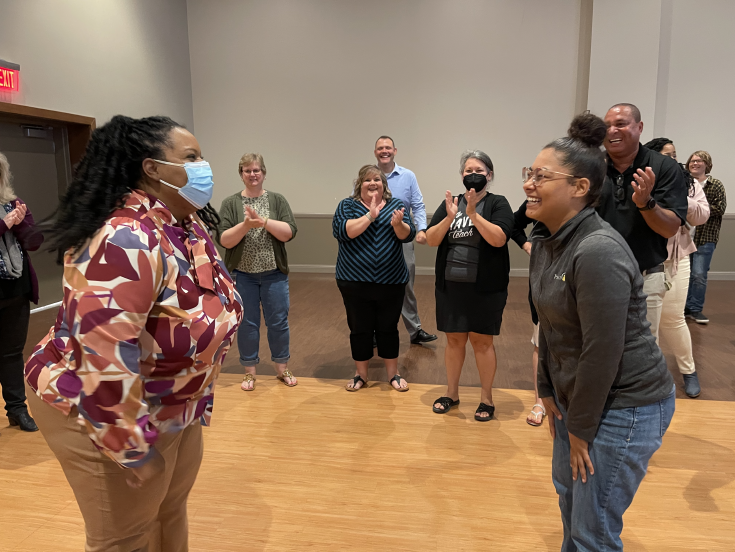As students returned to campus after the height of the COVID-19 pandemic, educators and administrators were hard at work identifying ways in which they could support emerging student needs. Drawing from Indigenous practice, the College of Education’s Dr. Dakesa Piña, diversity, equity and inclusion officer, and Dr. Robyn Seglem, professor in The School of Teaching and Learning, highlighted listening circles as a method to help cope with community-wide issues. To ensure that this was a sustainable, consistent practice for the college and campus community, Piña and Seglem partnered with the Regional Office of Education (ROE) 17 and Pathways 2 Restorative Leadership’s Kevin Jones to launch a restorative practices workshop series.
What are restorative practices?
“Restorative practices are proactive approaches and community-building approaches that head off conflict before it happens,” said Seglem. “Eighty percent of restorative practices are proactive.”
While shifting culture to avoid conflict is a main goal of restorative practices, it’s also essential to prepare communities to come together when conflict does arise. Rather than focusing solely on punishing the person that does harm, restorative practices employ restorative justice and focus on repairing the harm that has been done and supporting the person who has been harmed.
Piña notes that while this workshop series is offered as a resource for community partners, it will also greatly benefit the College itself. “Workplace culture is a critical component of recruitment and retention of quality faculty, staff, and students,” said Piña. “Imbedding restorative practices within the college culture will strengthen COE relationships and contribute to a healthy working and learning community.”
Workshop series underway
Initial workshop sessions were held June 21-23 and 27-29. They were well-attended by local educators and administrators, detention center workers, juvenile advocates and caseworkers, faculty and staff from various campus departments, and representatives from ROE 17 and Project Oz. Thanks to these groups’ participation and feedback, Jones will return to ISU’s campus to facilitate five more workshops during the 2022-23 academic year.
Seglem is looking forward to continuing this initiative, saying, “when more people are trained in the use of restorative practices, we have more sustainable models. That knowledge and mindset can be brought back to any community and result in positive change.”
Upcoming workshops will each run from 9 a.m.-4 p.m. Topic details can be found below, but Seglem emphasizes that everyone is welcome at all workshops; the topic does not need to fit someone’s background or job description for them to find value in the content.
Join us and register today!
- Restorative Approaches to Higher Education: August 26, 2022 | Register Online
- Participants will learn how to utilize restorative practices in higher education to connect faculty, staff, and students and provide research-based restorative practices to address harm that may occur within that setting.
- Social Justice, Equity, and Inclusion and Restorative Justice: October 14, 2022 | Register Online
- Participants will learn how to create a sense of belonging within their communities and to address historical and current issues around justice, equity, diversity, and inclusion topics that impact communities.
- Restorative Leadership: January 20, 2023 | Register Online
- Participants will learn how to utilize the restorative practices framework as a leadership model.
- Restorative Approaches to Adversity and Trauma: March 3, 2023 | Register Online
- Participants will learn how to respond to adversity and trauma through a restorative lens.
- Building and Restoring Community: May 12, 2023 | Register Online
- Participants will learn how restorative practices can and will positively impact overall community wellness.
Each session is offered at a discounted rate of $100 for all participants. When registering, 00000 should be entered in place of an IEIN.
Contact ROE 17 at 309-888-5120 with any questions.



